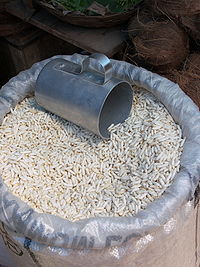Puffed grain: Difference between revisions
m Date/fix the maintenance tags or gen fixes |
Rajesh dangi (talk | contribs) added image Puffed_rice.jpg |
||
| Line 1: | Line 1: | ||
{{Unreferenced|date=June 2007}} |
{{Unreferenced|date=June 2007}} |
||
[[Image:Puffed_rice.JPG |thumb|left|200px|Puffed Rice kept for sale in Ulsoor Market,[[Bangalore]]]] |
|||
'''Puffed grain''' is the result of a process developed by Dr. Alexander P. Anderson of New York City in 1902. It was first manufactured by American Cereal Co. (which became [[Quaker Oats Co.]]) and was introduced at the [[St. Louis World's Fair]] in 1904 as [[puffed rice]]. |
'''Puffed grain''' is the result of a process developed by Dr. Alexander P. Anderson of New York City in 1902. It was first manufactured by American Cereal Co. (which became [[Quaker Oats Co.]]) and was introduced at the [[St. Louis World's Fair]] in 1904 as [[puffed rice]]. |
||
Distinct from [[popcorn]], which naturally pops and puffs itself with heating, puffed grain is created by placing whole grains under [[high pressure]] with [[steam]]. When the containment vessel's seal is suddenly broken, the entrained steam then flashes and bloats the [[endosperm]] of the [[seed|kernel]], increasing its volume to many times its original size. |
Distinct from [[popcorn]], which naturally pops and puffs itself with heating, puffed grain is created by placing whole grains under [[high pressure]] with [[steam]]. When the containment vessel's seal is suddenly broken, the entrained steam then flashes and bloats the [[endosperm]] of the [[seed|kernel]], increasing its volume to many times its original size. |
||
Revision as of 09:10, 17 July 2007

Puffed grain is the result of a process developed by Dr. Alexander P. Anderson of New York City in 1902. It was first manufactured by American Cereal Co. (which became Quaker Oats Co.) and was introduced at the St. Louis World's Fair in 1904 as puffed rice.
Distinct from popcorn, which naturally pops and puffs itself with heating, puffed grain is created by placing whole grains under high pressure with steam. When the containment vessel's seal is suddenly broken, the entrained steam then flashes and bloats the endosperm of the kernel, increasing its volume to many times its original size.
In the 1950s, the manufacturing was changed to a continuous production process that inspired the "shot from guns" slogan they used in advertising their puffed cereals.
Puffed rice or other grains are occasionally found as street food in China and Korea, where peddlers implement the puffing process using an integrated pushcart/puffer featuring a rotating steel pressure chamber heated over an open flame. The great booming sound produced by the release of pressure serves as advertising to attract customers.
One aspect of puffing is its simplicity. For instance, the ingredients for puffed rice can be just rice and perhaps salt for taste. Other products like Rice Krispies or Sugar Pops mix many ingredients into a homogeneous batter. The batter is then formed into kernel shapes and toasted. This causes them to rise, but not puff or pop.
Puffed grains are popular as breakfast cereals and in the form of "rice cakes". While it is easy to recognize that the cereals came from whole grains, the expansion factor for rice cakes is even greater, and the final product is somewhat more homogeneous.
The following grains can be puffed in a process described above:
Non-grains that could also be puffed in a similar process:
Snacks and food products made from puffed grain include:
- Bhelpuri (rice)
- Cheese puffs (corn)
- Golden Crisp (wheat)
- Kix (breakfast cereal)
- Puffed rice
- Smacks (wheat)
- Toffee Crisp (rice)
- Wotsits (corn)
- Yuba (soy beans)
Vegetarian meat analogs are produced by puffing soy meal. The term "Textured Vegetable Protein" is commonly used as a generic term for this product, but is actually a registered trademark of Archer Daniels Midland.
The same process is also used in the production of animal feeds.
Patent 2,653,097 "Puffed Corn and Method of Making Same" was issued on September 22, 1953 to John M. Baer of Chicago for the Guardite Corporation. Baer improved the process by suddenly cooling and dehydrating the product so that the final temperature is below 150 °F (65 °C) and preferably well below that. This prevented collapse of the product as the internal pressure drops. Baer's patent is listed as prior art in a number of other puffed food and puffed feed patents.
